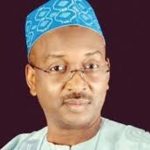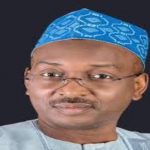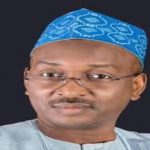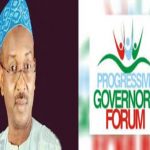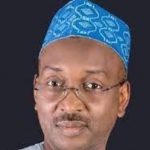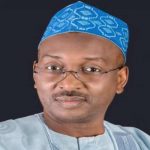The Director General of the Progressives Governors’ Forum and a chieftain of the ruling All Progressives Congress, Salihu Lukman has called for local funding of Civil Society Organizations, CSOs, by the Federal Government in order to reduce their dependence on foreign donors.
The APC chieftain said the foreign donors have links with the government of their countries.
In a statement titled, “Civil Society and Nigeria’s Democratic Development”, released on Monday, canvassed for greater level of collaboration between Federal government and Civil Society Organizations, CSOs, in the country in order to foster development and deepen Nigeria’s democracy.
Dr Salihu said the CSOs would continue to be loyal to the government of their foreign donors while dealing with FG as enemies so long as sources of funding for the work of these organizations were largely from foreign donors.
“Sadly, this negative orientation has pushed leaders of civil society in Nigeria to develop a mindset, which encourages them to positively relate with foreign organizations that are directly linked to governments in their countries but despise considering developing a positive or structured relationship with the Nigerian government. It is basically a belief that accepts a relationship with foreign governments as good but the relationship with Nigerian government is bad.
“Interestingly, however, individual leaders of civil society could have positive relations with functionaries of the Nigerian government. If it is okay for individual leaders of civil society to have positive relations with functionaries of the Nigerian government, why should civil society continue to resist negotiating improved relations with the Nigerian government? If Nigerian civil society can accept funding from foreign governments, why should it be difficult for them to take steps to negotiate structured local funding, which may include contributions from the Nigerian government?” he said.
The PGF DG averred that the problem of poor relations between Nigerian government and civil society has produced combination of poor funding and very weak organisations of civil society in the country.
The PGF DG blamed the frosty relationship between government and CSOs on the background of repressive military rule, which he said made campaigns for human rights and democracy to become the primary focus of the work of civil society, while a negative mindset that translated to opposition to Nigerian government remained deep-rooted among civil society leaders.
He said Civil society leaders believe that opposition to government is a requirement for their work, while on the other hand, government functionaries have contempt for civil society and their leaders.
“With all our realities in Nigeria, the consequence is that there are no guaranteed local funding sources available to support the work of civil society organisations. Sadly, there is no campaign in the country to create domestic funding sources for the work of civil society.
“Why should relationship with Nigerian government be considered bad, but relationship with foreign governments good? Most activists in civil society pretentiously overlooked this issue largely because good relationship with foreign governments enable them to access grants from organisations such as the UK Department for International Development (DFID), United States Agency for International Development (USAID), European Union (EU), etc. These are basically funding directly provided by governments of UK, US and countries under the European Union.
“Why should Nigerian civil society resent financial support from Nigerian government but accept from UK, US and EU governments? Isn’t it possible to negotiate conditions that makes funding from Nigerian government acceptable? Part of the disadvantage of refusal to consider negotiating stronger relationship between Nigerian civil society organisations and Nigerian government is that work of these organisations are dictated by priorities set by foreign donor organisations,” the statement said.
The Director General of the Progressives Governors’ Forum and a chieftain of the ruling All Progressives Congress, Salihu Lukman has called for local funding of Civil Society Organizations, CSOs, by the Federal Government in order to reduce their dependence on foreign donors.
The APC chieftain said the foreign donors have links with the government of their countries.
In a statement titled, “Civil Society and Nigeria’s Democratic Development”, released on Monday, canvassed for greater level of collaboration between Federal government and Civil Society Organizations, CSOs, in the country in order to foster development and deepen Nigeria’s democracy.
Dr Salihu said the CSOs would continue to be loyal to the government of their foreign donors while dealing with FG as enemies so long as sources of funding for the work of these organizations were largely from foreign donors.
“Sadly, this negative orientation has pushed leaders of civil society in Nigeria to develop a mindset, which encourages them to positively relate with foreign organizations that are directly linked to governments in their countries but despise considering developing a positive or structured relationship with the Nigerian government. It is basically a belief that accepts a relationship with foreign governments as good but the relationship with Nigerian government is bad.
“Interestingly, however, individual leaders of civil society could have positive relations with functionaries of the Nigerian government. If it is okay for individual leaders of civil society to have positive relations with functionaries of the Nigerian government, why should civil society continue to resist negotiating improved relations with the Nigerian government? If Nigerian civil society can accept funding from foreign governments, why should it be difficult for them to take steps to negotiate structured local funding, which may include contributions from the Nigerian government?” he said.
The PGF DG averred that the problem of poor relations between Nigerian government and civil society has produced combination of poor funding and very weak organisations of civil society in the country.
The PGF DG blamed the frosty relationship between government and CSOs on the background of repressive military rule, which he said made campaigns for human rights and democracy to become the primary focus of the work of civil society, while a negative mindset that translated to opposition to Nigerian government remained deep-rooted among civil society leaders.
He said Civil society leaders believe that opposition to government is a requirement for their work, while on the other hand, government functionaries have contempt for civil society and their leaders.
“With all our realities in Nigeria, the consequence is that there are no guaranteed local funding sources available to support the work of civil society organisations. Sadly, there is no campaign in the country to create domestic funding sources for the work of civil society.
“Why should relationship with Nigerian government be considered bad, but relationship with foreign governments good? Most activists in civil society pretentiously overlooked this issue largely because good relationship with foreign governments enable them to access grants from organisations such as the UK Department for International Development (DFID), United States Agency for International Development (USAID), European Union (EU), etc. These are basically funding directly provided by governments of UK, US and countries under the European Union.
“Why should Nigerian civil society resent financial support from Nigerian government but accept from UK, US and EU governments? Isn’t it possible to negotiate conditions that makes funding from Nigerian government acceptable? Part of the disadvantage of refusal to consider negotiating stronger relationship between Nigerian civil society organisations and Nigerian government is that work of these organisations are dictated by priorities set by foreign donor organisations,” the statement said.
The Director General of the Progressives Governors’ Forum and a chieftain of the ruling All Progressives Congress, Salihu Lukman has called for local funding of Civil Society Organizations, CSOs, by the Federal Government in order to reduce their dependence on foreign donors.
The APC chieftain said the foreign donors have links with the government of their countries.
In a statement titled, “Civil Society and Nigeria’s Democratic Development”, released on Monday, canvassed for greater level of collaboration between Federal government and Civil Society Organizations, CSOs, in the country in order to foster development and deepen Nigeria’s democracy.
Dr Salihu said the CSOs would continue to be loyal to the government of their foreign donors while dealing with FG as enemies so long as sources of funding for the work of these organizations were largely from foreign donors.
“Sadly, this negative orientation has pushed leaders of civil society in Nigeria to develop a mindset, which encourages them to positively relate with foreign organizations that are directly linked to governments in their countries but despise considering developing a positive or structured relationship with the Nigerian government. It is basically a belief that accepts a relationship with foreign governments as good but the relationship with Nigerian government is bad.
“Interestingly, however, individual leaders of civil society could have positive relations with functionaries of the Nigerian government. If it is okay for individual leaders of civil society to have positive relations with functionaries of the Nigerian government, why should civil society continue to resist negotiating improved relations with the Nigerian government? If Nigerian civil society can accept funding from foreign governments, why should it be difficult for them to take steps to negotiate structured local funding, which may include contributions from the Nigerian government?” he said.
The PGF DG averred that the problem of poor relations between Nigerian government and civil society has produced combination of poor funding and very weak organisations of civil society in the country.
The PGF DG blamed the frosty relationship between government and CSOs on the background of repressive military rule, which he said made campaigns for human rights and democracy to become the primary focus of the work of civil society, while a negative mindset that translated to opposition to Nigerian government remained deep-rooted among civil society leaders.
He said Civil society leaders believe that opposition to government is a requirement for their work, while on the other hand, government functionaries have contempt for civil society and their leaders.
“With all our realities in Nigeria, the consequence is that there are no guaranteed local funding sources available to support the work of civil society organisations. Sadly, there is no campaign in the country to create domestic funding sources for the work of civil society.
“Why should relationship with Nigerian government be considered bad, but relationship with foreign governments good? Most activists in civil society pretentiously overlooked this issue largely because good relationship with foreign governments enable them to access grants from organisations such as the UK Department for International Development (DFID), United States Agency for International Development (USAID), European Union (EU), etc. These are basically funding directly provided by governments of UK, US and countries under the European Union.
“Why should Nigerian civil society resent financial support from Nigerian government but accept from UK, US and EU governments? Isn’t it possible to negotiate conditions that makes funding from Nigerian government acceptable? Part of the disadvantage of refusal to consider negotiating stronger relationship between Nigerian civil society organisations and Nigerian government is that work of these organisations are dictated by priorities set by foreign donor organisations,” the statement said.
The Director General of the Progressives Governors’ Forum and a chieftain of the ruling All Progressives Congress, Salihu Lukman has called for local funding of Civil Society Organizations, CSOs, by the Federal Government in order to reduce their dependence on foreign donors.
The APC chieftain said the foreign donors have links with the government of their countries.
In a statement titled, “Civil Society and Nigeria’s Democratic Development”, released on Monday, canvassed for greater level of collaboration between Federal government and Civil Society Organizations, CSOs, in the country in order to foster development and deepen Nigeria’s democracy.
Dr Salihu said the CSOs would continue to be loyal to the government of their foreign donors while dealing with FG as enemies so long as sources of funding for the work of these organizations were largely from foreign donors.
“Sadly, this negative orientation has pushed leaders of civil society in Nigeria to develop a mindset, which encourages them to positively relate with foreign organizations that are directly linked to governments in their countries but despise considering developing a positive or structured relationship with the Nigerian government. It is basically a belief that accepts a relationship with foreign governments as good but the relationship with Nigerian government is bad.
“Interestingly, however, individual leaders of civil society could have positive relations with functionaries of the Nigerian government. If it is okay for individual leaders of civil society to have positive relations with functionaries of the Nigerian government, why should civil society continue to resist negotiating improved relations with the Nigerian government? If Nigerian civil society can accept funding from foreign governments, why should it be difficult for them to take steps to negotiate structured local funding, which may include contributions from the Nigerian government?” he said.
The PGF DG averred that the problem of poor relations between Nigerian government and civil society has produced combination of poor funding and very weak organisations of civil society in the country.
The PGF DG blamed the frosty relationship between government and CSOs on the background of repressive military rule, which he said made campaigns for human rights and democracy to become the primary focus of the work of civil society, while a negative mindset that translated to opposition to Nigerian government remained deep-rooted among civil society leaders.
He said Civil society leaders believe that opposition to government is a requirement for their work, while on the other hand, government functionaries have contempt for civil society and their leaders.
“With all our realities in Nigeria, the consequence is that there are no guaranteed local funding sources available to support the work of civil society organisations. Sadly, there is no campaign in the country to create domestic funding sources for the work of civil society.
“Why should relationship with Nigerian government be considered bad, but relationship with foreign governments good? Most activists in civil society pretentiously overlooked this issue largely because good relationship with foreign governments enable them to access grants from organisations such as the UK Department for International Development (DFID), United States Agency for International Development (USAID), European Union (EU), etc. These are basically funding directly provided by governments of UK, US and countries under the European Union.
“Why should Nigerian civil society resent financial support from Nigerian government but accept from UK, US and EU governments? Isn’t it possible to negotiate conditions that makes funding from Nigerian government acceptable? Part of the disadvantage of refusal to consider negotiating stronger relationship between Nigerian civil society organisations and Nigerian government is that work of these organisations are dictated by priorities set by foreign donor organisations,” the statement said.
The Director General of the Progressives Governors’ Forum and a chieftain of the ruling All Progressives Congress, Salihu Lukman has called for local funding of Civil Society Organizations, CSOs, by the Federal Government in order to reduce their dependence on foreign donors.
The APC chieftain said the foreign donors have links with the government of their countries.
In a statement titled, “Civil Society and Nigeria’s Democratic Development”, released on Monday, canvassed for greater level of collaboration between Federal government and Civil Society Organizations, CSOs, in the country in order to foster development and deepen Nigeria’s democracy.
Dr Salihu said the CSOs would continue to be loyal to the government of their foreign donors while dealing with FG as enemies so long as sources of funding for the work of these organizations were largely from foreign donors.
“Sadly, this negative orientation has pushed leaders of civil society in Nigeria to develop a mindset, which encourages them to positively relate with foreign organizations that are directly linked to governments in their countries but despise considering developing a positive or structured relationship with the Nigerian government. It is basically a belief that accepts a relationship with foreign governments as good but the relationship with Nigerian government is bad.
“Interestingly, however, individual leaders of civil society could have positive relations with functionaries of the Nigerian government. If it is okay for individual leaders of civil society to have positive relations with functionaries of the Nigerian government, why should civil society continue to resist negotiating improved relations with the Nigerian government? If Nigerian civil society can accept funding from foreign governments, why should it be difficult for them to take steps to negotiate structured local funding, which may include contributions from the Nigerian government?” he said.
The PGF DG averred that the problem of poor relations between Nigerian government and civil society has produced combination of poor funding and very weak organisations of civil society in the country.
The PGF DG blamed the frosty relationship between government and CSOs on the background of repressive military rule, which he said made campaigns for human rights and democracy to become the primary focus of the work of civil society, while a negative mindset that translated to opposition to Nigerian government remained deep-rooted among civil society leaders.
He said Civil society leaders believe that opposition to government is a requirement for their work, while on the other hand, government functionaries have contempt for civil society and their leaders.
“With all our realities in Nigeria, the consequence is that there are no guaranteed local funding sources available to support the work of civil society organisations. Sadly, there is no campaign in the country to create domestic funding sources for the work of civil society.
“Why should relationship with Nigerian government be considered bad, but relationship with foreign governments good? Most activists in civil society pretentiously overlooked this issue largely because good relationship with foreign governments enable them to access grants from organisations such as the UK Department for International Development (DFID), United States Agency for International Development (USAID), European Union (EU), etc. These are basically funding directly provided by governments of UK, US and countries under the European Union.
“Why should Nigerian civil society resent financial support from Nigerian government but accept from UK, US and EU governments? Isn’t it possible to negotiate conditions that makes funding from Nigerian government acceptable? Part of the disadvantage of refusal to consider negotiating stronger relationship between Nigerian civil society organisations and Nigerian government is that work of these organisations are dictated by priorities set by foreign donor organisations,” the statement said.
The Director General of the Progressives Governors’ Forum and a chieftain of the ruling All Progressives Congress, Salihu Lukman has called for local funding of Civil Society Organizations, CSOs, by the Federal Government in order to reduce their dependence on foreign donors.
The APC chieftain said the foreign donors have links with the government of their countries.
In a statement titled, “Civil Society and Nigeria’s Democratic Development”, released on Monday, canvassed for greater level of collaboration between Federal government and Civil Society Organizations, CSOs, in the country in order to foster development and deepen Nigeria’s democracy.
Dr Salihu said the CSOs would continue to be loyal to the government of their foreign donors while dealing with FG as enemies so long as sources of funding for the work of these organizations were largely from foreign donors.
“Sadly, this negative orientation has pushed leaders of civil society in Nigeria to develop a mindset, which encourages them to positively relate with foreign organizations that are directly linked to governments in their countries but despise considering developing a positive or structured relationship with the Nigerian government. It is basically a belief that accepts a relationship with foreign governments as good but the relationship with Nigerian government is bad.
“Interestingly, however, individual leaders of civil society could have positive relations with functionaries of the Nigerian government. If it is okay for individual leaders of civil society to have positive relations with functionaries of the Nigerian government, why should civil society continue to resist negotiating improved relations with the Nigerian government? If Nigerian civil society can accept funding from foreign governments, why should it be difficult for them to take steps to negotiate structured local funding, which may include contributions from the Nigerian government?” he said.
The PGF DG averred that the problem of poor relations between Nigerian government and civil society has produced combination of poor funding and very weak organisations of civil society in the country.
The PGF DG blamed the frosty relationship between government and CSOs on the background of repressive military rule, which he said made campaigns for human rights and democracy to become the primary focus of the work of civil society, while a negative mindset that translated to opposition to Nigerian government remained deep-rooted among civil society leaders.
He said Civil society leaders believe that opposition to government is a requirement for their work, while on the other hand, government functionaries have contempt for civil society and their leaders.
“With all our realities in Nigeria, the consequence is that there are no guaranteed local funding sources available to support the work of civil society organisations. Sadly, there is no campaign in the country to create domestic funding sources for the work of civil society.
“Why should relationship with Nigerian government be considered bad, but relationship with foreign governments good? Most activists in civil society pretentiously overlooked this issue largely because good relationship with foreign governments enable them to access grants from organisations such as the UK Department for International Development (DFID), United States Agency for International Development (USAID), European Union (EU), etc. These are basically funding directly provided by governments of UK, US and countries under the European Union.
“Why should Nigerian civil society resent financial support from Nigerian government but accept from UK, US and EU governments? Isn’t it possible to negotiate conditions that makes funding from Nigerian government acceptable? Part of the disadvantage of refusal to consider negotiating stronger relationship between Nigerian civil society organisations and Nigerian government is that work of these organisations are dictated by priorities set by foreign donor organisations,” the statement said.
The Director General of the Progressives Governors’ Forum and a chieftain of the ruling All Progressives Congress, Salihu Lukman has called for local funding of Civil Society Organizations, CSOs, by the Federal Government in order to reduce their dependence on foreign donors.
The APC chieftain said the foreign donors have links with the government of their countries.
In a statement titled, “Civil Society and Nigeria’s Democratic Development”, released on Monday, canvassed for greater level of collaboration between Federal government and Civil Society Organizations, CSOs, in the country in order to foster development and deepen Nigeria’s democracy.
Dr Salihu said the CSOs would continue to be loyal to the government of their foreign donors while dealing with FG as enemies so long as sources of funding for the work of these organizations were largely from foreign donors.
“Sadly, this negative orientation has pushed leaders of civil society in Nigeria to develop a mindset, which encourages them to positively relate with foreign organizations that are directly linked to governments in their countries but despise considering developing a positive or structured relationship with the Nigerian government. It is basically a belief that accepts a relationship with foreign governments as good but the relationship with Nigerian government is bad.
“Interestingly, however, individual leaders of civil society could have positive relations with functionaries of the Nigerian government. If it is okay for individual leaders of civil society to have positive relations with functionaries of the Nigerian government, why should civil society continue to resist negotiating improved relations with the Nigerian government? If Nigerian civil society can accept funding from foreign governments, why should it be difficult for them to take steps to negotiate structured local funding, which may include contributions from the Nigerian government?” he said.
The PGF DG averred that the problem of poor relations between Nigerian government and civil society has produced combination of poor funding and very weak organisations of civil society in the country.
The PGF DG blamed the frosty relationship between government and CSOs on the background of repressive military rule, which he said made campaigns for human rights and democracy to become the primary focus of the work of civil society, while a negative mindset that translated to opposition to Nigerian government remained deep-rooted among civil society leaders.
He said Civil society leaders believe that opposition to government is a requirement for their work, while on the other hand, government functionaries have contempt for civil society and their leaders.
“With all our realities in Nigeria, the consequence is that there are no guaranteed local funding sources available to support the work of civil society organisations. Sadly, there is no campaign in the country to create domestic funding sources for the work of civil society.
“Why should relationship with Nigerian government be considered bad, but relationship with foreign governments good? Most activists in civil society pretentiously overlooked this issue largely because good relationship with foreign governments enable them to access grants from organisations such as the UK Department for International Development (DFID), United States Agency for International Development (USAID), European Union (EU), etc. These are basically funding directly provided by governments of UK, US and countries under the European Union.
“Why should Nigerian civil society resent financial support from Nigerian government but accept from UK, US and EU governments? Isn’t it possible to negotiate conditions that makes funding from Nigerian government acceptable? Part of the disadvantage of refusal to consider negotiating stronger relationship between Nigerian civil society organisations and Nigerian government is that work of these organisations are dictated by priorities set by foreign donor organisations,” the statement said.
The Director General of the Progressives Governors’ Forum and a chieftain of the ruling All Progressives Congress, Salihu Lukman has called for local funding of Civil Society Organizations, CSOs, by the Federal Government in order to reduce their dependence on foreign donors.
The APC chieftain said the foreign donors have links with the government of their countries.
In a statement titled, “Civil Society and Nigeria’s Democratic Development”, released on Monday, canvassed for greater level of collaboration between Federal government and Civil Society Organizations, CSOs, in the country in order to foster development and deepen Nigeria’s democracy.
Dr Salihu said the CSOs would continue to be loyal to the government of their foreign donors while dealing with FG as enemies so long as sources of funding for the work of these organizations were largely from foreign donors.
“Sadly, this negative orientation has pushed leaders of civil society in Nigeria to develop a mindset, which encourages them to positively relate with foreign organizations that are directly linked to governments in their countries but despise considering developing a positive or structured relationship with the Nigerian government. It is basically a belief that accepts a relationship with foreign governments as good but the relationship with Nigerian government is bad.
“Interestingly, however, individual leaders of civil society could have positive relations with functionaries of the Nigerian government. If it is okay for individual leaders of civil society to have positive relations with functionaries of the Nigerian government, why should civil society continue to resist negotiating improved relations with the Nigerian government? If Nigerian civil society can accept funding from foreign governments, why should it be difficult for them to take steps to negotiate structured local funding, which may include contributions from the Nigerian government?” he said.
The PGF DG averred that the problem of poor relations between Nigerian government and civil society has produced combination of poor funding and very weak organisations of civil society in the country.
The PGF DG blamed the frosty relationship between government and CSOs on the background of repressive military rule, which he said made campaigns for human rights and democracy to become the primary focus of the work of civil society, while a negative mindset that translated to opposition to Nigerian government remained deep-rooted among civil society leaders.
He said Civil society leaders believe that opposition to government is a requirement for their work, while on the other hand, government functionaries have contempt for civil society and their leaders.
“With all our realities in Nigeria, the consequence is that there are no guaranteed local funding sources available to support the work of civil society organisations. Sadly, there is no campaign in the country to create domestic funding sources for the work of civil society.
“Why should relationship with Nigerian government be considered bad, but relationship with foreign governments good? Most activists in civil society pretentiously overlooked this issue largely because good relationship with foreign governments enable them to access grants from organisations such as the UK Department for International Development (DFID), United States Agency for International Development (USAID), European Union (EU), etc. These are basically funding directly provided by governments of UK, US and countries under the European Union.
“Why should Nigerian civil society resent financial support from Nigerian government but accept from UK, US and EU governments? Isn’t it possible to negotiate conditions that makes funding from Nigerian government acceptable? Part of the disadvantage of refusal to consider negotiating stronger relationship between Nigerian civil society organisations and Nigerian government is that work of these organisations are dictated by priorities set by foreign donor organisations,” the statement said.



